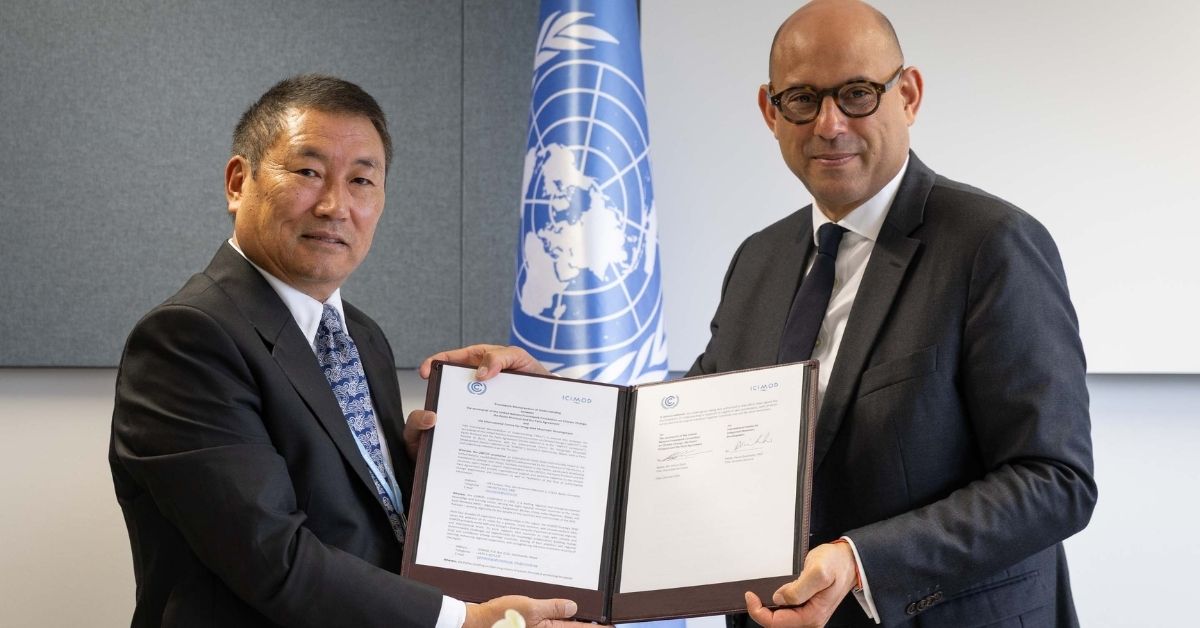

 23.61°C काठमाडौं
23.61°C काठमाडौं

Kathmandu: The International Centre for Integrated Mountain Development (ICIMOD) and the United Nations Framework Convention on Climate Change (UNFCCC, also known as UN Climate Change) on June 24 signed a three-year memorandum of understanding to strengthen climate action in the countries of the Hindu Kush Himalayas.
According to a press release from ICIMOD, Simon Stiell, UN Climate Change Executive Secretary, and Pema Gyamtsho, Director General, ICIMOD, signed the agreement on the sidelines of this year’s UN June Climate Meetings, formally called the 62nd session of the Subsidiary Bodies (SB 62). The meetings help advance key climate issues and prepare decisions for adoption at the COP30 UN Climate Change Conference in Belém, Brazil, this November.
The agreement comes as sustained and concerted efforts by a coalition of stakeholders to foreground mountain issues within the global climate discourse gather momentum.
Highlights include the June 2023’s Expert Dialogue on Mountains and Climate Change with Harry Vreuls, Chair of the UN Subsidiary Body for Scientific and Technological Advice (SBSTA) at last year’s June Climate Meetings; as well as high-level convenings by ICIMOD members states, including the Prime Minister of Bhutan’s ministerial meeting at COP29, and the Government of Nepal’s flagship Sagarmatha Sambaad dialogue – on ‘Mountains, Climate Change, and the Future of Humanity’ – held in Kathmandu in May this year.
The three-year partnership between ICIMOD and UN Climate Change, which leverages and deepens ICIMOD’s long-standing status as an observer of the UN Climate Change process, focuses on: Strengthening climate change leadership and engagement within and beyond the Hindu Kush Himalayan region; Building regional and national capacity for implementation of the UN Climate Change Paris Agreement; and Developing research and evidence to support climate policy-making and climate-smart investment.
A central plank of the partnership will be in supporting governments implement the Enhanced Transparency Framework (ETF), whereby countries transparently track progress towards meeting emission reduction commitments and adapting to climate change, as well as identifying needs for support.
The ETF is a core part of the 2015 Paris Agreement, a legally binding international treaty on climate change. The Paris Agreement aims to keep the temperature rise to well below 1.5ºC above pre-industrial levels and to reduce the risk of increasingly severe climate change impacts, such as more frequent and severe droughts, heatwaves, and rainfall.
The Hindu Kush Himalaya (HKH) region is frontline of the effects of climate change, with visible and felt impacts on its ecosystems and communities. The melting cryosphere has caused significant impacts, leading to water insecurity, food shortages, increased disasters such as glacial lake outburst flows (GLOFs), biodiversity loss, and rising poverty, affecting both mountain communities and those downstream.
Source: ICIMOD